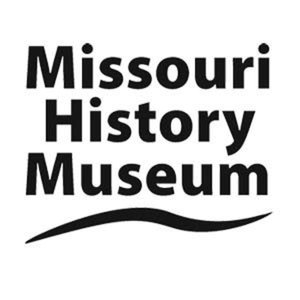from Apr. 20, 1865
"The Last of the Earth"
-
Full Title
"The Last of the Earth. The Greatest Demonstration Ever Made on the Pacific Coast"
-
Description
April 20, 1865 edition of San Francisco's Daily Alta in which the article describes the funeral obsequies performed for Lincoln.
-
Source
Library of Congress Alfred Whital Stern Collection of Lincolniana, portfolio 6, no. 4
-
Rights
This item is in the public domain and may be reproduced and used for any purpose, including research, teaching, private study, publication, broadcast or commercial use, with proper citation and attribution
-
Tags
-
Cite this Item
Daily Alta. ""The Last of the Earth. The Greatest Demonstration Ever Made on the Pacific Coast"". Remembering Lincoln. Web. Accessed May 15, 2025. https://rememberinglincoln.fords.org/node/742
-
Creator
Daily Alta
-
Date
April 20, 1865
from Apr. 20, 1865
"The Last of the Earth. The Greatest Demonstration Ever Made on the Pacific Coast"

-
Description
April 20, 1865 edition of San Francisco's Daily Alta in which the article describes the funeral obsequies performed for Lincoln.
-
Source
Library of Congress Alfred Whital Stern Collection of Lincolniana, portfolio 6, no. 4
-
Rights
This item is in the public domain and may be reproduced and used for any purpose, including research, teaching, private study, publication, broadcast or commercial use, with proper citation and attribution
-
Creator
Daily Alta
-
Date
April 20, 1865
from Apr. 19, 1865
Order of Exercises for Lincoln's Funeral
-
Full Title
Order of Exercises, Occasion of the Funeral of Abraham Lincoln
-
Description
Order of exercises for Lincoln's funeral. Published by Wm. H. Huse & Co., Printers, Newburyport, Massachusetts, April 19, 1865
-
Source
Library of Congress, Alfred Whital Stern Collection of Lincolniana portfolio 16, no. 33
-
Rights
This item is in the public domain and may be reproduced and used for any purpose, including research, teaching, private study, publication, broadcast or commercial use, with proper citation and attribution
-
Tags
-
Cite this Item
Wm. H. Huse & Co., Printers, Newburyport, Massachusetts. "Order of Exercises, Occasion of the Funeral of Abraham Lincoln". Remembering Lincoln. Web. Accessed May 15, 2025. https://rememberinglincoln.fords.org/node/737
-
Creator
Wm. H. Huse & Co., Printers, Newburyport, Massachusetts
-
Date
April 19, 1865
from Apr. 19, 1865
Order of Exercises, Occasion of the Funeral of Abraham Lincoln
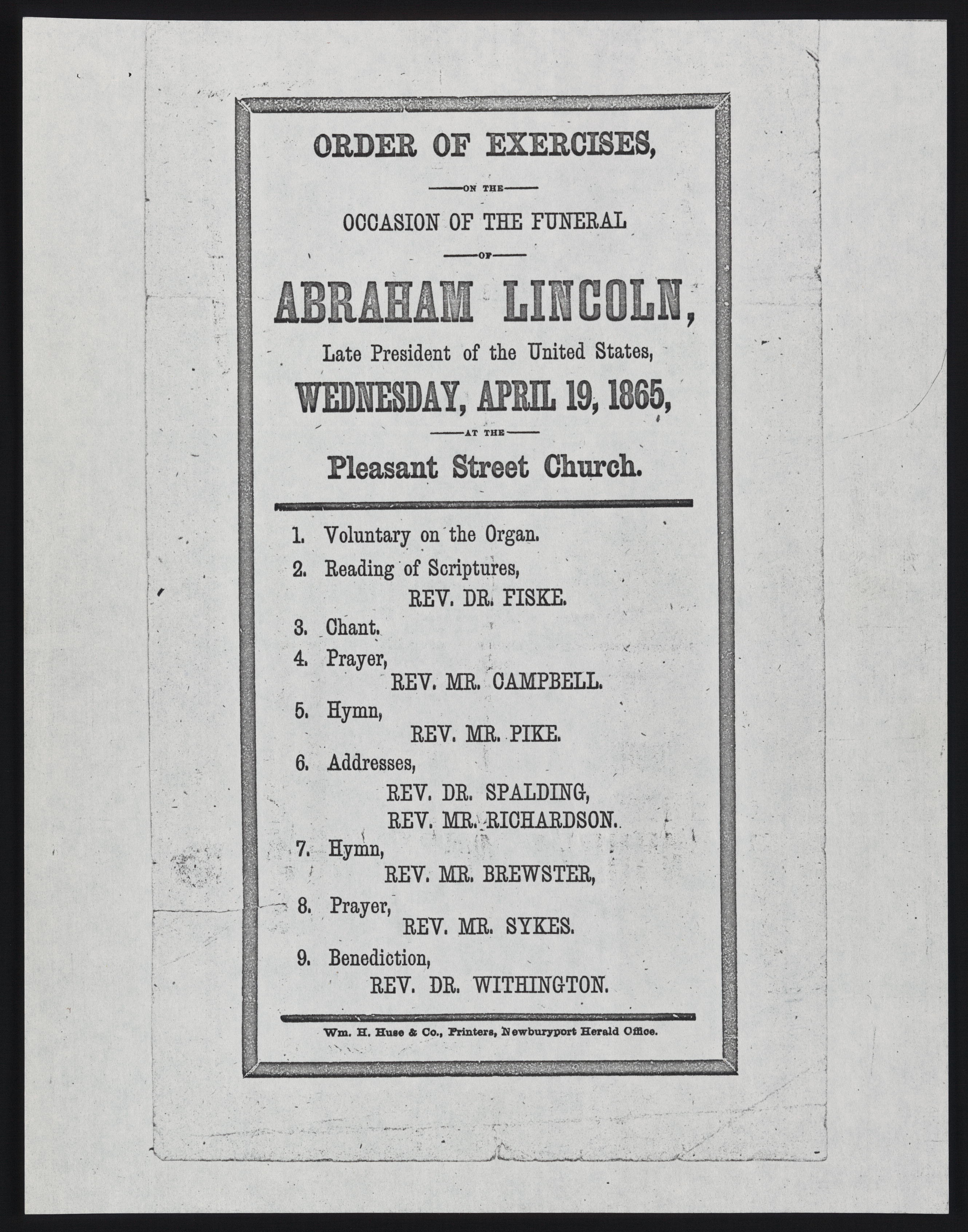
-
Description
Order of exercises for Lincoln's funeral. Published by Wm. H. Huse & Co., Printers, Newburyport, Massachusetts, April 19, 1865
-
Source
Library of Congress, Alfred Whital Stern Collection of Lincolniana portfolio 16, no. 33
-
Rights
This item is in the public domain and may be reproduced and used for any purpose, including research, teaching, private study, publication, broadcast or commercial use, with proper citation and attribution
-
Creator
Wm. H. Huse & Co., Printers, Newburyport, Massachusetts
-
Date
April 19, 1865
from Apr. 19, 1865
Willie Clark to Ida Clark
-
Full Title
Willie Clark to Ida Clark
-
Description
Willie Clark, the Petersen House boarder who lived in the room in which President Lincoln died, wrote to his sister four days after Lincoln's death. He described the scene in Washington, including funeral preparations, the hunt for the killers, and, most notably, souvenir hunters who daily came into his room. Clark himself kept some souvenirs, and sent others to his sister.
-
Transcription
Washington, DC
Wednesday Monday April 19, 1865
Dear Sister Ida.
To day the funeral of Mr. Lincoln takes place, the streets are being crowded at this early hour. (9 A M) and the procession will probably not move for 3 hours. We are moved back into the old building (Cor. 15 1/2.) It having been repaired. Ladies are thronging in here now, I have moved my desk close to my window to secure its use for myself and friends.
The past few days have been of intense excitement. Arrests are numerously made, of any party heard to utter secesh sentiments. The time has come when people cannot say what they please, the people are awfully indignant. Leinency is no longer to be thought of. A new code must be adopted.
They talk of the tyranical administration of Mr. Lincoln, but we have a man now for a president who will teach the south a lesson they will know well how to appreciate.
Since the death of our president hundreds daily call at the house to gain admission into my room.
I was engaged nearly all of Sunday with one of Frank Leslies Special Artist aiding him viz making a correct drawing of the last moments of Mr. Lincoln, as I knew the position of every one present he succeeded in executing a fine sketch, which will appear in their paper the last of this week. He intends, from this same drawing to have some fine large steel engravings executed. He also took a sketch of nearly every article in my room which will appear in their paper. He wished to mention the names of all in the room particularly the pothographs of yourself, Clara and Nannie, but I told him he must not do that, as they were members of my family and I did not wish them to be made so public. He also urged me to give him my picture or at least to allow him to take my sketch, but I could not see that. either.
Everybody has a great desire to obtain some memento from my room so that whoever comes in has to be closely watched for fear they will steal something.
I have a lock of his hair which I have had neatly framed, also a piece of linen with a portion of his brain, the pillow and case upon which he lay when he died and nearly all his wearing apparel but the latter I intend to send to Robt Lincoln as soon as the funeral is over, as I consider him the one most justly entitled to them.
The same matrass is on my bed, and the same coverlit covers me nightly that covered him while dying.
Enclosed you will find a piece of lace that Mrs. Lincoln wore on her head during the evening and was dropped by her while entering my room to see her dying husband It is worth keeping for its historical value.
The cap worked by Clara and the cushion by you, you little dreamed would be so historically connected with such an event.
I received your letter but before I answer it I must see what I can do. With that exception I have not received any letters although you blame me for not writing when to my knowledge I have written four, and you must be aware I am very anxious to hear about mothers health which in your letter you did not mention.
I wrote auntie a letter about a week ago and enclosed a love letter to Ella promising to marry her when I get to be 21.
Remember me to Henry Littlefield. Tell him I shall write him soon. Remember to Mrs . Little and family and all enquiring friends.
Love to father mother
and Clara, and dont forget you have a brother and send me a longer note soon.
I will write again soon.
Your affe. Brother
Willie
Please not give away any of this lace, out of our own family.
Envelope addressed to Miss Ida F. Clark, No. 7 Warren Street,
Boston Mass.
-
Source
National Park Service, Ford's Theatre National Historic Site; transcription by Richard Sloan, Surratt Courier, April 1991
-
Rights
This item is in the public domain and may be reproduced and used for any purpose, including research, teaching, private study, publication, broadcast or commercial use, with proper citation and attribution.
-
Tags
-
Cite this Item
William Clark. "Willie Clark to Ida Clark". Remembering Lincoln. Web. Accessed May 15, 2025. https://rememberinglincoln.fords.org/node/707
-
Creator
William Clark
-
Date
April 19, 1865
from Apr. 19, 1865
Willie Clark to Ida Clark
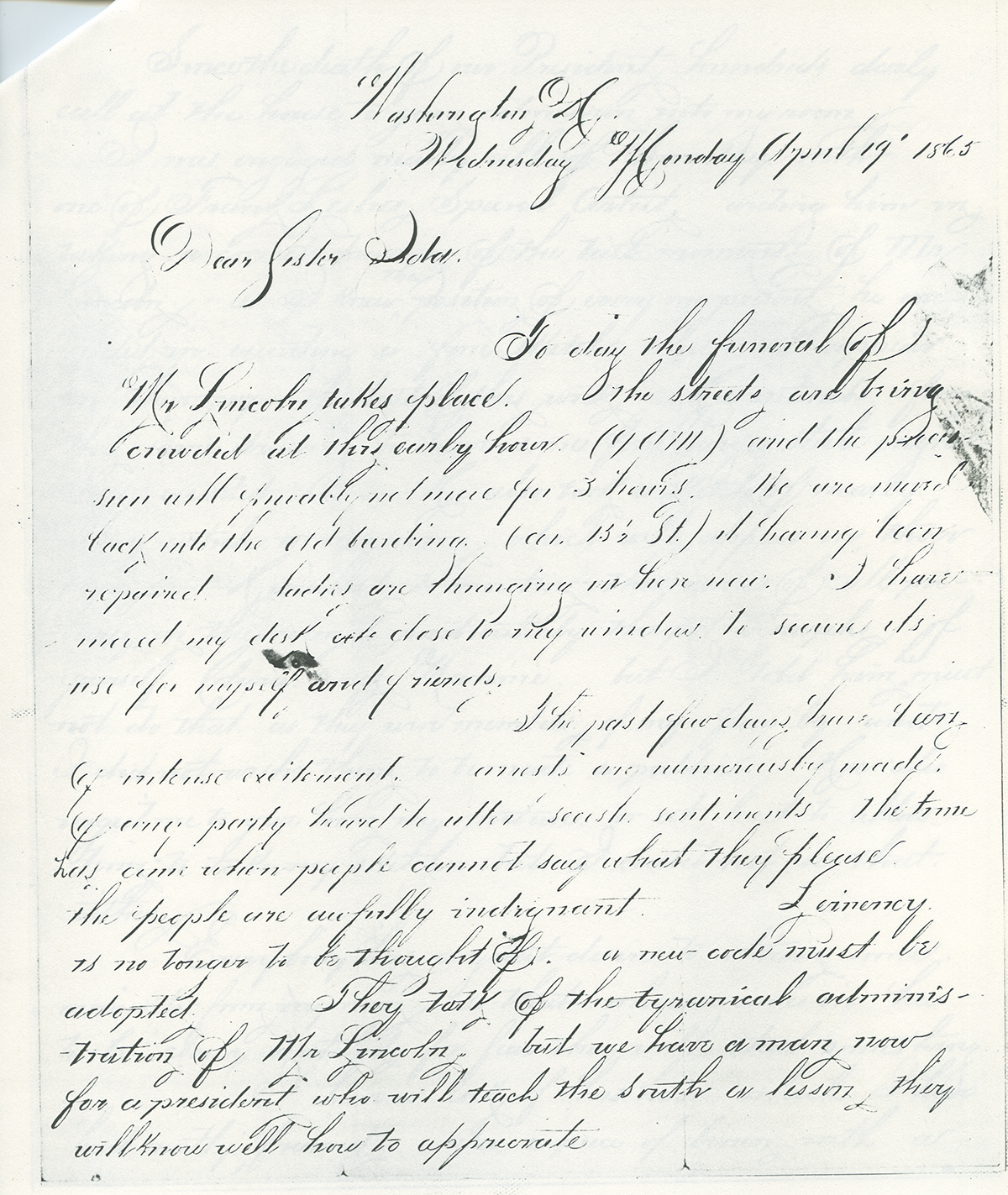
-
Description
Willie Clark, the Petersen House boarder who lived in the room in which President Lincoln died, wrote to his sister four days after Lincoln's death. He described the scene in Washington, including funeral preparations, the hunt for the killers, and, most notably, souvenir hunters who daily came into his room. Clark himself kept some souvenirs, and sent others to his sister.
-
Source
National Park Service, Ford's Theatre National Historic Site; transcription by Richard Sloan, Surratt Courier, April 1991
-
Rights
This item is in the public domain and may be reproduced and used for any purpose, including research, teaching, private study, publication, broadcast or commercial use, with proper citation and attribution.
-
Creator
William Clark
-
Date
April 19, 1865
from Apr. 30, 1865
Horatio Nelson Taft Diary, April 30, 1865
-
Full Title
Horatio Nelson Taft Diary, April 30, 1865
-
Description
Patent examiner Horatio Nelson Taft discussed the events of the previous month, calling April 1865 "the most eventful in the History of our Country."
-
Transcription
April 30th 1865
This has been a most eventful month. The most eventful in the History of our Country. We have seen during this month the complete crushing out of the “Great rebellion” by a series of masterly Military achievements. The occupation of the Rebel Capitol by our troops. The surrender of Genl Lee with his Army near Richmond, and the surrender of Genl Johnson and his Army in North Carolina, and above all in importance which has occured in the World during this month, The President of the United States has been assassinated. Abraham Lincoln, the good and kind hearted, was Shot while sitting in his Box at Fords Theatre on the night of the 14th Int at about half past ten O'clock. Mr Lincoln had been in the habit of attending the Theatre occasionaly, perhaps once in four or six weeks, as a relaxation from the arduous duties of his position and constant mental exertion. On this occasion he went rather reluctantly. But it had been published in the Bills that Himself and Genl Grant would be present, and Genl Grant having left the City in the evening train for Phila, the President said that he did not “wish the people to be disappointed” and so went with his Lady arriving about ½ past 8. Miss Harris (daughter of Hon Ira Harris) and Maj Rathbone of Albany were also in the same Box, which was a double one, two being thrown into one. This Box was in the 2nd Tier and entered from the Dress circle through a narrow corridor some three feet wide and eight or ten long. There was a door at the dress circle end and at the other end there were two doors, one for each Box but now the two Boxes being thrown into one, one of the doors was closed. The other was open, and all of them unguarded. The assassin J Wilkes Booth had made his arrangements in the most deliberate manner (probably during that day). He had fixed a bar across the door leading into the dress circle and had cut a hole through the closed door leading to the Box, which enabled him to see the exact position of the President and others in the Box without being seen himself. At about ½ past 10, he entered the corridor from the Dress circle, bared the door to prevent any one from entering, examined the position of Mr Lincoln through the hole in the closed door. Then entered the Box behind all who were there (as they were looking toward the stage) and standing within three or four feet of Mr Lincoln, Shot him in the back of the head. The ball entering about two inches from the left ear near the base of the skull and lodging in the brain about two inches back of the right eye. His head was probably inclined forward at the time. The Murderer rushed to the front of the Box with a dagger in his hand. Major Rathbone caught his coat but Booth struck him on the arm with the dagger wounding him severely, which compelled him to let go his hold. Booth vaulted over the front of the Box and as he did so exclaimed “Sic Semper Tyranis” (Thus To Tyrants). As he Jumped from the box his spur cau[gh]t in the flag and as he struck the to see the exact position of the President and others in the Box without being seen himself. At about ½ past 10, he entered the corridor from the Dress circle, bared the door to prevent any one from entering, examined the position of Mr Lincoln through the hole in the closed door. Then entered the Box behind all who were there (as they were looking toward the stage) and standing within three or four feet of Mr Lincoln, Shot him in the back of the head. The ball entering about two inches from the left ear near the base of the skull and lodging in the brain about two inches back of the right eye. His head was probably inclined forward at the time. The Murderer rushed to the front of the Box with a dagger in his hand. Major Rathbone caught his coat but Booth struck him on the arm with the dagger wounding him severely, which compelled him to let go his hold. Booth vaulted over the front of the Box and as he did so exclaimed “Sic Semper Tyranis” (Thus To Tyrants). As he Jumped from the box his spur cau[gh]t in the flag and as he struck the Stage he came to a crouching position from the effect of the concussion, his hands striking the floor but he recovered himself in a moment and flourishing his dagger he strode across the Stage some forty feet in sight of the spectators and past some of the actors, and reaching the back door which opens into a lane, he mounted a fleet horse and escaped. The lane enters F St betwen 9th & 10 Sts. The audience was paralized for some seconds, but rushed on to the Stage. A Surgeon was called for and Charles S Taft a Surgeon being present was lifted up from the Stage to the Box by those present. Before this the bar had been removed by Maj Rathbone and several men had reached the Box. When Chas reached the Box the President was lying upon the floor. Water and stimulants were used immediately but without avail in attempts to revive him. He was taken up and carried from the Theatre to the House opposite in
about fifteen minutes after he was shot. A Dr Leale from Armory Square Hospital was the first Surgeon in the box. But Chas did not know that there was any Surgeon but himself present until the President was removed from the Theatre. Chas had charge of him until Dr Stone (the Presidents family Physician) arrived which was half an hour after he was placed on a bed at the House of Mr Peterson, opposite. When the shot was fired Mrs Lincoln was sitting near her husband with her hand on his knee. She says she saw the flash and heard the report of the pistol, thinking it was in some way connected with the the Play. She leaned forward to see what it was, and then looked to Mr Lincoln to see where he was looking. He was sitting with his head droped down and eyes shut. She was not alarmed at this, he sometimes held his head in that way when in deep thought, but she put her hand on his forehead and he not stirring she put it on the back of his head and feeling it wet she immediately withdrew it covered with blood. She then screamed and that is the last she remembered that took place in the Theatre. She says, as she put her hand on his head she recollects that something suddenly brushed past her and rubbing off her Shawl. It was Booth as he jumped from the Box. The President made no noise, nor attempted to speak, nor Stirred a limb after he was shot, nor was he conscious for one moment from that time until he died. When his skin was touched or his hand was taken, there was a slight quiver or tremor of the muscles, but that was all. Mustard paste was applied nearly all over the body and stimulants were given as long as he could swallow in hopes to revive him but entirely without avail. His pulse ceased to beat at 22 minutes past Seven. Chas had his hand on his heart, he said it fluttered or trilled for 10 seconds longer. It was the opinion of the Surgeons that the wound would have killed most men instantly, or in a very few minutes. But Mr Lincoln had so much vitality that he lived nearly nine hours. There were four Surgeons in immediate or active attendance. Dr Stone, The Surgeon Genl Dr Barnes, The Assistant Surgeon Genl Dr Crane and Charles. Some others were present whose services were not required. Most of the members of the Cabinet were there all night. Chief Justice Chase and other distinguished men. Mr Senator Sumner with Robert Lincoln leaning on his shoulder near the head of the bed. Sec'y Stanton was active in giving directions and writing dispatches all night. Genl Meigs Stood at the door to keep out all who were not wanted or to see that the room was not crowded. The room is at the end of the entrance Hall about 9 feet by 15, with two windows and three doors, one door entering from the Hall, one at the left as you enter, opening to an open porch or piazza, and the other at the farther end of the room, opening into another small room from which stairs decended to to [sic] the Basement. Some few individuals came in to the room through that door clandestinely. Mrs Lincoln occupied a room near by with some of her friends who were there. She went in frequently to see the President with Doct Gurley (The family Pastor) who had been sent for about 3 O'clock. She was not in the room when he died. Robert Lincoln was there and Dr Gurley, the two private Secretaries of the President Nicolay and Hay. Upon one occasion when Mrs L went in and saw her husband she fainted and was carried out insensible. It was thought best for her not to be there when he died. Dr Gurley prayed by the bedside of the President when he first arrived (at 3 o'clock). Then went into the room where Mrs Lincoln was and prayed with her, and remained with her most of the time, accompanying her and supporting her into the room of the dying President when she visited it. After the death Dr Gurley who was standing near Mr Stanton said shall we have any religious exercises here or elsewhere now? Yes said Mr Stanton offer Prayer ________ now and here. For the last half hour before the death, the utmost stillness had prevailed in the room, not a word, not a whisper was heard. The President of the United States dying, surrounded by his Cabinet and many of the first men in the Nation standing like statues around the bed presented a scene for an artist seldom equaled for solemn grandeur. It is to be hoped that it will yet be transfered to Canvass. After the President died Dr Gurley went to Mrs L and told her “the President is dead.” O - why did you not let me know? Why did you not tell me? “Your friends thought it was not best. You must be resigned to the will of God. You must be calm and trust in God and in your friends.” She soon after left, with Dr G for her Home. She was asked during the night if her son “Tad” (Thaddeus) (a boy about twelve years old) should be sent for. “O, my poor “Taddy” what will become of him? O do not send for him, his violent grief would disturb the House.” When they reached the Presidents house “Tad” met them on the Portico. “Where is my Pa? Where is my Pa? He kept repeating the question till they got into the room of Mrs Lincoln. He had heard that his Pa had been shot but evidently expected him when his mother came. He was very much excited and alarmed but had not thought that his Pa could be dead. “Taddy” your Pa is dead” said Dr Gurley. He was not prepared for this. He screamed in an agony of grief “O what shall I do? What shall I do? My Brother is dead. My Father is dead. O what shall I do? What will become of me? O what shall I do? O mother you will not die will you. O don't you die Ma. You wont die will you Mother? If you die I shall be all alone. O dont die Ma.” Dr Gurley said that up to that time he himself had not shed a tear, but he could not witness “Tads” grief unmoved and the Tears flowed freely. He said, when I got back to my own house at about 10 o'clock that morning, “I felt as though I had been engaged all night in a terrible Battle and had but just strength enough left to drag myself off the field.” -
Source
-
Rights
This item is in the public domain and may be reproduced and used for any purpose, including research, teaching, private study, publication, broadcast or commercial use, with proper citation and attribution.
-
Tags
-
Cite this Item
Horatio Nelson Taft. "Horatio Nelson Taft Diary, April 30, 1865". Remembering Lincoln. Web. Accessed May 15, 2025. https://rememberinglincoln.fords.org/node/691
-
Creator
Horatio Nelson Taft
-
Date
April 30, 1865
from Apr. 30, 1865
Horatio Nelson Taft Diary, April 30, 1865
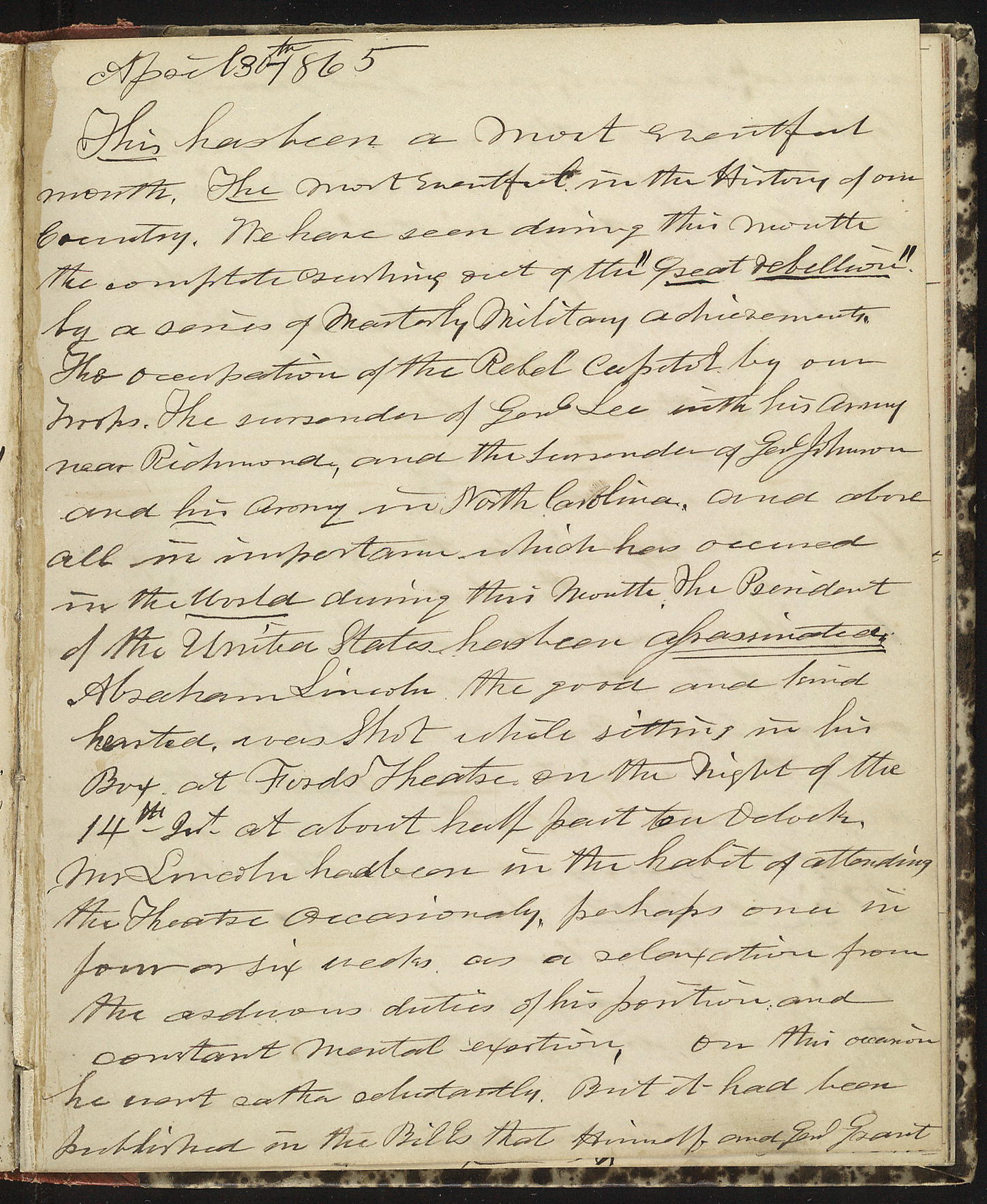
-
Description
Patent examiner Horatio Nelson Taft discussed the events of the previous month, calling April 1865 "the most eventful in the History of our Country."
-
Source
-
Rights
This item is in the public domain and may be reproduced and used for any purpose, including research, teaching, private study, publication, broadcast or commercial use, with proper citation and attribution.
-
Creator
Horatio Nelson Taft
-
Date
April 30, 1865
from Apr. 19, 1865
Admission Ticket to the White House
-
Full Title
Admission Ticket to the White House
-
Description
A black-bordered admission ticket to call at the White House during the official mourning period.
-
Transcription
EAST.
Admit the Bearer to the
EXECUTIVE MANSION,
On WEDNESDAY, the 19th of April, 1865
[Transcription by: Dr. Susan Corbesero, Ellis School, Pittsburgh, Pennsylvania] -
Source
-
Rights
This item is in the Public Domain.
-
Tags
-
Cite this Item
United States Government. "Admission Ticket to the White House". Remembering Lincoln. Web. Accessed May 15, 2025. https://rememberinglincoln.fords.org/node/682
-
Creator
United States Government
-
Date
April 19, 1865
-
Material
Paper
from Apr. 19, 1865
Admission Ticket to the White House
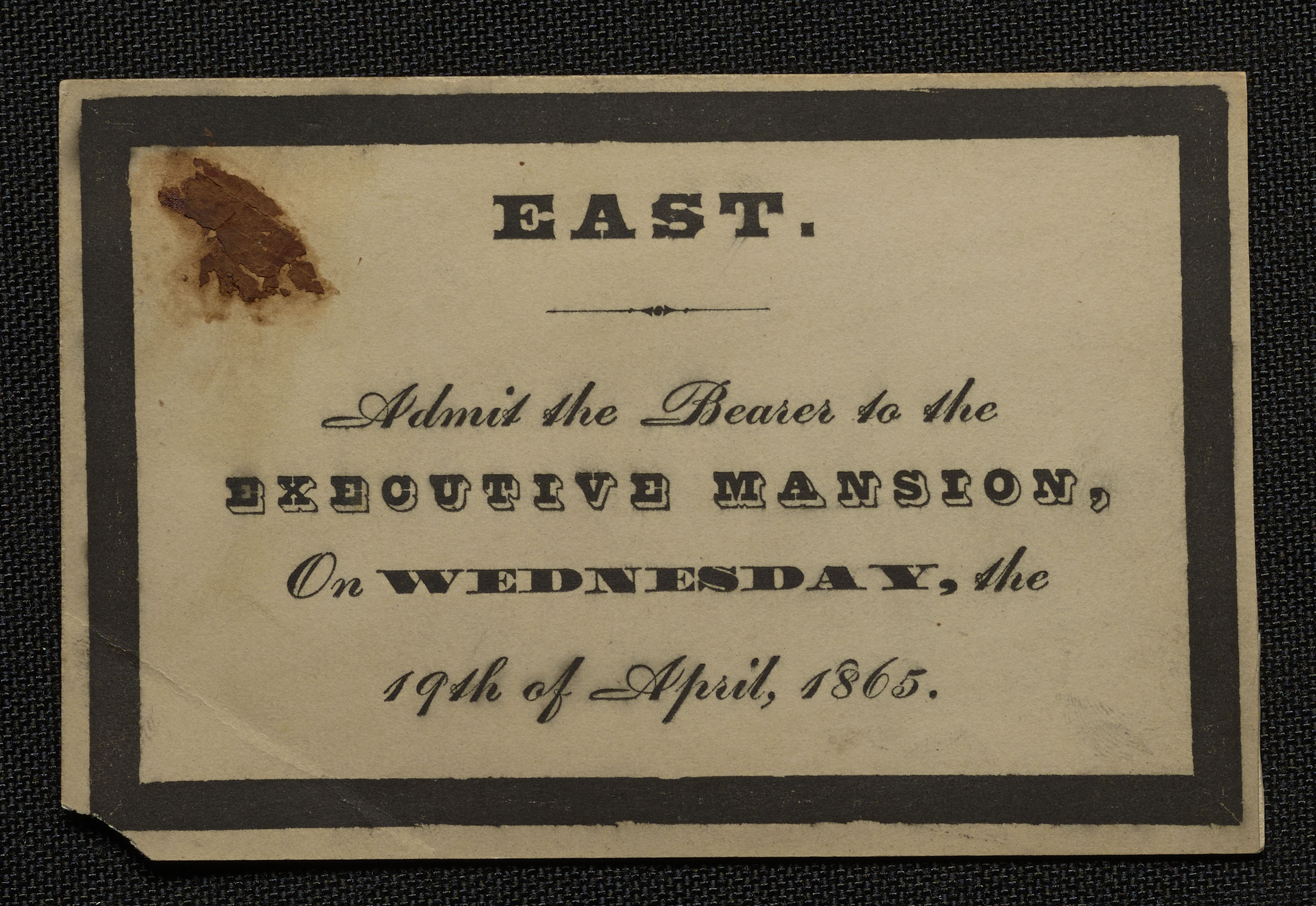
-
Description
A black-bordered admission ticket to call at the White House during the official mourning period.
-
Source
-
Rights
This item is in the Public Domain.
-
Creator
United States Government
-
Date
April 19, 1865
-
Material
Paper
from Apr. 1, 1865
Note to George Harrington
-
Full Title
Note of George Harrington regarding guests at the White House for Abraham Lincoln's funeral, [April 1865]
-
Description
Concerns provisions for the admission of persons who are to be at the President's House, for those who have cards to the Green and East Rooms, and arrangements for them to have admission to carriages in the procession.
-
Transcription
Nothing has been done to provide for the admission of persons in who are to be at President's House, and to have a right to places in the carriages.
Of course those who have cards to the Green & East Rooms will have but it is inappropriate that all of them can get into the carriages.
Nor has any arrangement been made as to the number of carriages to be admitted into the President’s Grounds, nor for the admission of the delegations from Illinois and Kentucky.
Who has charge of the carriages for the procession:
[Transcription team:
Austin B., Danny H., Preston P., and Hunter P.
New Hampton Middle School, New Hampton, Iowa] -
Rights
This item is in the public domain.
-
Tags
-
Cite this Item
Harrington, George, 1815-1892. "Note of George Harrington regarding guests at the White House for Abraham Lincoln's funeral, [April 1865]". Remembering Lincoln. Web. Accessed May 15, 2025. https://rememberinglincoln.fords.org/node/677
from Apr. 1, 1865
Note of George Harrington regarding guests at the White House for Abraham Lincoln's funeral, [April 1865]
![Note of George Harrington regarding guests at the White House for Abraham Lincoln's funeral, [April 1865]](https://rememberinglincoln.fords.org/sites/default/files/227-Note%20to%20George%20Harrington.jpg)
-
Description
Concerns provisions for the admission of persons who are to be at the President's House, for those who have cards to the Green and East Rooms, and arrangements for them to have admission to carriages in the procession.
-
Rights
This item is in the public domain.
-
Creator
Harrington, George, 1815-1892
-
Date
April 1, 1865
-
Material
from Apr. 1, 1865
Printed Order of Funeral Procession
-
Full Title
Printed order of the procession of the funeral of Abraham Lincoln, [April 1865]
-
Description
A printed order of the Abraham Lincoln's funeral procession
-
Source
A0653_7
-
Rights
This item is in the public domain.
-
Tags
-
Cite this Item
anonymous. "Printed order of the procession of the funeral of Abraham Lincoln, [April 1865]". George R. Harrington Papers. Remembering Lincoln. Web. Accessed May 15, 2025. https://rememberinglincoln.fords.org/node/676
from Apr. 1, 1865
Printed order of the procession of the funeral of Abraham Lincoln, [April 1865]
![Printed order of the procession of the funeral of Abraham Lincoln, [April 1865]](https://rememberinglincoln.fords.org/sites/default/files/226-Printed%20Order%20of%20Funeral%20Procession%2C%20page%201.jpg)
-
Description
A printed order of the Abraham Lincoln's funeral procession
-
Source
A0653_7
-
Rights
This item is in the public domain.
-
Creator
anonymous
-
Publisher
George R. Harrington Papers
-
Date
April 1, 1865
from Apr. 22, 1865
Mourning Ribbon, Philadelphia Services
-
Full Title
Mourning ribbon for services in honor of Lincoln in Philadelphia.
-
Description
Red, blue, white, and black cloth ribbon with framed photographic portrait of Lincoln at center and cared attached above reading: "Obsequies of Abraham Lincoln, Late President of the United States, Philadelphia, April 22nd 1865, at the Hall of Independence from 10 to 12 o'clock P.M. Entrance at the Court House, on Sixth below Chestnut Street.
-
Source
-
Rights
This item is in the Public Domain.
-
Tags
-
Cite this Item
Unknown. "Mourning ribbon for services in honor of Lincoln in Philadelphia. ". Remembering Lincoln. Web. Accessed May 15, 2025. https://rememberinglincoln.fords.org/node/688
-
Creator
Unknown
-
Date
April 22, 1865
from Apr. 22, 1865
Mourning ribbon for services in honor of Lincoln in Philadelphia.
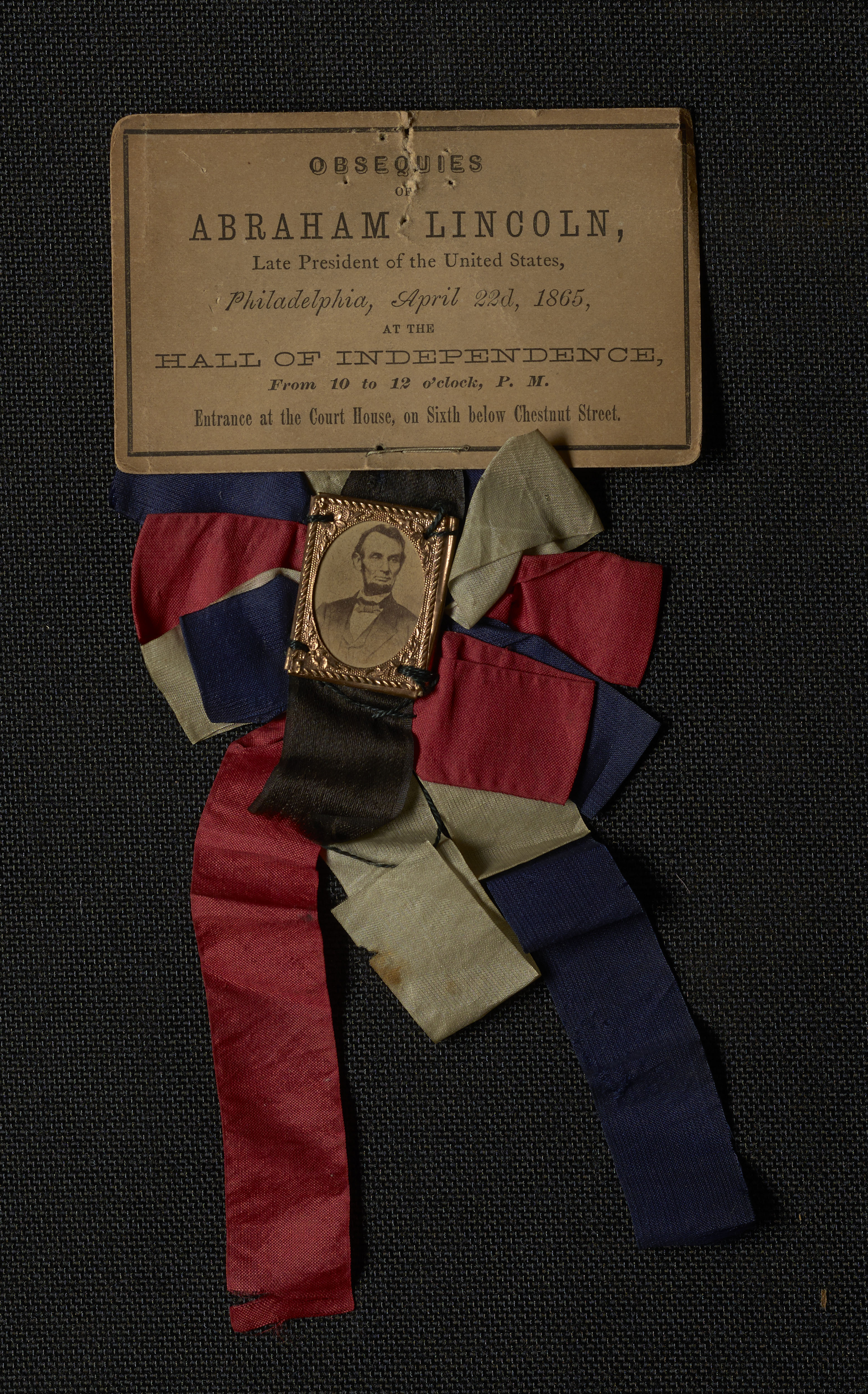
-
Description
Red, blue, white, and black cloth ribbon with framed photographic portrait of Lincoln at center and cared attached above reading: "Obsequies of Abraham Lincoln, Late President of the United States, Philadelphia, April 22nd 1865, at the Hall of Independence from 10 to 12 o'clock P.M. Entrance at the Court House, on Sixth below Chestnut Street.
-
Source
-
Rights
This item is in the Public Domain.
-
Creator
Unknown
-
Date
April 22, 1865
from Apr. 1, 1865
List of Pallbearers
-
Full Title
List of pallbearers for Abraham Lincoln's funeral, [April 1865]
-
Description
A list of the pallbearers for Lincoln's funeral, divided into those of the Senate and those of the House.
-
Transcription
Pall Bearers.
On the part _______On the part
Of the Senate _____of the House
Mr. Foster of Conn._Mr. Davis of Mass.
Morgan of N.Y._____Coffroth of Pa
Johnson of Md_____Smith of Ky
Yates of Ill.________Colfax of Ind.
Wade of O.________Worthington of Nevada
Conness of Cal.____Washburn of Ill.
Army
Navy
Civilians
O. S. Browning Thom Corwin
Harrington's writing
-
Source
-
Rights
This item is in the public domain.
-
Tags
-
Cite this Item
anonymous. "List of pallbearers for Abraham Lincoln's funeral, [April 1865]". Remembering Lincoln. Web. Accessed May 15, 2025. https://rememberinglincoln.fords.org/node/681
from Apr. 1, 1865
List of pallbearers for Abraham Lincoln's funeral, [April 1865]
![List of pallbearers for Abraham Lincoln's funeral, [April 1865]](https://rememberinglincoln.fords.org/sites/default/files/231-Pallbearers.jpg)
-
Description
A list of the pallbearers for Lincoln's funeral, divided into those of the Senate and those of the House.
-
Source
-
Rights
This item is in the public domain.
-
Creator
anonymous
-
Date
April 1, 1865
from May. 1, 1865
Original Draft of Funeral Plans
-
Full Title
Original draft of plans for President Abraham Lincoln's funeral procession, [April 1865]
-
Description
Outlines plans for the procession starting at the Executive Mansion on April 18, where the public can view the remains of the President in the East Room. The procession will then continue on the 19th with religious ceremonies, after which the remains will be brought to the Capitol and placed in the Rotunda. After that, the delegation from Illinois will bring the President's body home to Springfield by train.
-
Transcription
Proposed arrangements for the funeral and disposition of the remains of the late President, submitted for approval.
The Executive Mansion, under proper police and guards, to be thrown open during Tuesday, the 18th inst. For the public to show their respect, -the remains to be in the East Room, under a guard of commissioned officers of the Army.
On Wednesday, the procession to form at 11 o’clock, the religious ceremonies to commence at 12, and the procession to move at 2 P.M.
The remains to be escorted to the Capitol, and there deposited in the Rotunda, to remain under a suitable guard, to be provided by the proper military authorities.
The delegation especially appointed from Illinois to receive the remains and escort them thither, to be called the “Body Guard”, to have them in special charge after they shall have been deposited in the Capitol.
The remains to be taken to the depot on Thursday morning, by military escort; a guard of honor, consisting of such Senators and Members of the House of Representatives as may be designated for that purpose by those bodies respectively, and also such other civilians as the Cabinet may determine, to accompany the remains to their final resting place. The whole to be accompanied by such military escort as the proper authorities may designate -
Rights
This item is in the public domain.
-
Tags
-
Cite this Item
Harrington, George, 1815-1892. "Original draft of plans for President Abraham Lincoln's funeral procession, [April 1865]". Remembering Lincoln. Web. Accessed May 15, 2025. https://rememberinglincoln.fords.org/node/674
from May. 1, 1865
Original draft of plans for President Abraham Lincoln's funeral procession, [April 1865]
![Original draft of plans for President Abraham Lincoln's funeral procession, [April 1865]](https://rememberinglincoln.fords.org/sites/default/files/224-Original%20Draft%2C%20page%201.jpg)
-
Description
Outlines plans for the procession starting at the Executive Mansion on April 18, where the public can view the remains of the President in the East Room. The procession will then continue on the 19th with religious ceremonies, after which the remains will be brought to the Capitol and placed in the Rotunda. After that, the delegation from Illinois will bring the President's body home to Springfield by train.
-
Rights
This item is in the public domain.
-
Creator
Harrington, George, 1815-1892
-
Date
May 1, 1865
-
Material
